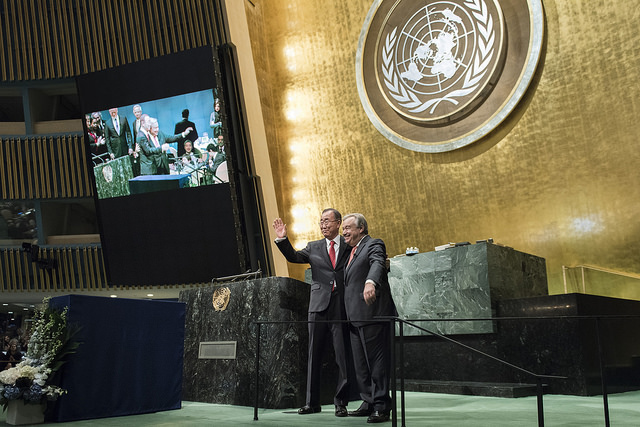
Last week New York’s attention was focused briefly on another major political transition taking place in 2017. A few blocks from Trump Tower on Fifth Avenue, ambassadors, diplomats and UN staffers were meeting in the halls of the UN General Assembly on Manhattan’s East Side to observe Antonio Guterres take the oath of office to become the ninth Secretary-General of the United Nations.
Few people would envy the transition brief that Guterres will inherit on 1 January 2017. More than 65 million people displaced around the globe; devastating and intractable conflicts in places such as Syria, Yemen, and Libya; over-burdened peacekeeping missions in South Sudan, the Central African Republic and Mali; challenges to democratic governance in countries such as Burundi, The Gambia and the Democratic Republic of the Congo; not to mention the global threats of terrorism, the potential for nuclear proliferation, or the emerging consequences of our changing climate.
Having served as prime minister of Portugal for seven years, as well as UN High Commissioner for Refugees for over a decade, Guterres is in the unique position of having served as a former head of state as well as worked within the UN system. He’s well aware of the geopolitical, administrative and bureaucratic limitations of the organisation.
The success of Secretaries-General, like that of most political leaders, is difficult to measure and largely in the eye of the beholder. But it’s worthwhile considering Guterres’ job description. The UN Charter sets out the responsibilities of the position as ‘chief administrative officer’ for the organisation. The gig includes managing the overall direction of a Secretariat that now includes more than 40,000 staff, in addition to broader oversight of more than 100,000 uniformed personnel in peace operations.
While Guterres’ influence will be limited by the political and financial control exerted by the 193 member-state stakeholders that make up the organisation, one area where he’ll have significant influence (as noted by Sarah Frankel here) will be in the selection of senior UN leadership. With only 21.5% of senior leadership positions (as of 30 June 2016) filled by females and the disappointment that followed the failure to appoint a woman to the role of Secretary-General, there’ll be pressure on Guterres to fulfill his pledge on gender parity in leadership positions. He appears to be off to a welcome start announcing the appointment of three women to senior posts in the last week, including Nigeria’s Environment Minister, Amina Mohammed, as his deputy secretary-general.
Given the challenges facing UN peace operations, Guterres must set clear expectations for his representatives in the field and hold them accountable. The current Secretary-General Ban Ki-moon took the somewhat controversial step of requesting the resignation of his special representative in the Central African Republic after the mission neglected to address incidents of sexual exploitation and abuse. He also removed the force commander in South Sudan after the mission failed to protect civilians. Both decisions sent clear messages on the importance of accountability, but they weren’t without consequences.
Crisis management and engagement with the Security Council will form a central part of Guterres’ role. Yet that’s an area where Secretaries-General have often felt limits on their power. The permanent and veto-wielding members of the Council’s P5—China, France, Russia, the United Kingdom and the United States—have the most influence on matters of international peace and security. Despite the rare consensus on display earlier this week in relation to Syria, relations in the Council have been acutely strained in recent years over Syria. Such member state political dynamics are likely to become increasingly complicated and less predictable in the year ahead—the new Trump administration, the modalities of Brexit and the French Presidential election, not to mention the increasing military assertiveness of Russia and China.
The Secretary-General’s influence in the Security Council is limited. But he has authority under Article 99 of the Charter to bring to the Council matters which ‘may threaten the maintenance of international peace and security’. While the spirit of the article has been drawn upon to draw issues to the attention of the Council in closed consultations, it’s rarely been formally invoked. As with previous Secretaries-General, it’ll be a careful political balancing act for Guterres—any over-zealous initiative that contravenes the interests of the P5 may see him follow Boutros Boutros Ghali’s lead and only serve one five-year term. It remains to be seen whether concessions have been made to China or Russia for certain leadership posts in exchange for support for his candidacy as Secretary-General.
Although the job description for UN Secretary-General lacks detail, the international community has come to expect a lot from those serving in the office over the last 70 years. That’s probably best reflected by the UN website which notes that ‘the Secretary-General is a symbol of the United Nations ideals and a spokesman for the interests of the world’s peoples.’ After taking the oath of office, Guterres acknowledged the need to trust the ‘institutions that serve and protect us.’
That’s a lofty goal, and Gutteres might be better off aiming for a single term if he’s out to succeed.

